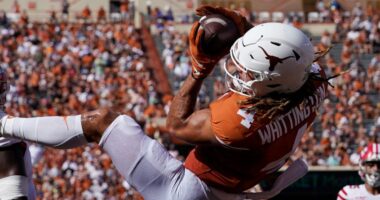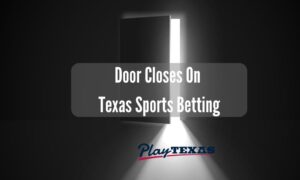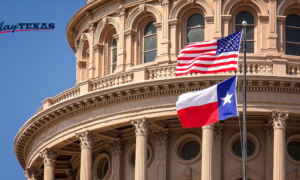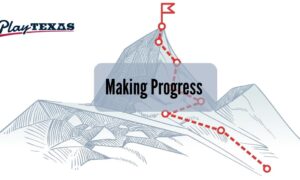
Selling player data represents an opportunity for collegiate bodies to make serious money if sports betting agencies tap into it.
More than two dozen states have legalized sports betting in some form in recent months. Between six and eight more states could follow suit this year. This comes after the Supreme Court struck down the Professional and Amateur Sports Protection Act, the 1992 law that barred state-authorized sports gambling.
In light of this, collegiate sports groups are turning their gaze to gambling–based revenue streams emerging out of this new landscape.
Player-data partnerships could cloud legalization
There are states, however, where legalized gaming is not on the horizon – Texas being the biggest state. Legal Texas online sports betting could happen in 2023, depending on the state legislature.
In such states, player-data partnerships muck the already cloudy water for legislators looking to maintain the status quo.
Beyond the implications for legalized gaming, selling player data has equally–complex implications. These lie in another battleground in college sports: the amateur status of players. If player data starts getting sold to data firms, who stands to gain in the deal?
Scholarly pursuits and big-time deals
For reference, Alston v. NCAA ruled that educational scholarships could not be restricted as severely by the NCAA. Additionally, there is a current NCPA complaint alleging that black athletes are uniquely disadvantaged in terms of scholarships.
If these factors are any indication, current player-data partnerships might spark the ire of everyone involved in compensating players.
At the moment, two conferences, the MAC and the PAC–12, have made deals with different data firms. This comes one year after the NBA and NFL made similar deals. This profited the two leagues more than $100 million in just the first year.
We’ll take a look at what those deals mean for the conferences involved. What effect could these have on the sports gaming industry?
The MAC and Genius Sports
The Middle America Conference (MAC) and London-based Genius Sports made a five-year deal in early March that gives Genius Sports the right to manage and market all statistics for all sports in the conference. Included in this deal is the condition that sports betting agencies wishing to purchase this data must pay the MAC directly for access to it.
This kind of granular, real–time data allows sportsbooks to set the most accurate, up-to-the-minute lines. It also gives them the ability to offer what is being called microbets. These bets allow the bettor to decide such things as the 21st, 22nd, or 23rd point of the game. This advantage creates a huge impact on what the sportsbooks are able to offer.
This year’s March Madness was quite possibly the most significant sporting period for microbetting.
PointsBet was the only online book offering microbets. These bets were based on PointsBet’s unofficial data system allowing them to set odds at a frenetic pace.
PointsBet made a major gamble, as a flaw in the algorithm could result in huge losses. Even worse, it could cause the locking out of bettors in the periods when scores start changing quickly.
What Genius Sports seeks to do for the MAC is provide security and stability for the implementation of this data, whether shared for fun or profit.
If the relationship between Genius and the MAC works out, questions remain about whether sportsbooks choosing to offer microbets should be mandated to use the official data offered by groups like Genius.
PAC-12 and Tempus Ex Machina
The PAC–12 followed the MAC in a deal of their own with the California technology company Tempus Ex Machina. This deal, unlike the MAC deal, did not make allowances for the sale of player data to sportsbooks.
However, the fact that PAC-12 network’s President, Mark Shugan, said the deal does not “currently” allow for sportsbooks to use the data seems to suggest that the potential exists. Tempus plans to launch their platform this fall for a range of free–to–play opportunities and other data-driven products.
One of the products they’ll be offering to all PAC-12 schools is a library of all the camera feeds available from all PAC-12 games. This way, schools can search for footage based on a player’s name, number, or even style of play.
The main goal of PAC-12’s current deal is “fan engagement,” as reiterated by both the conference and Tempus.
Making collegiate data accessible for Sportsbooks
When the NFL and NBA launched their player-data deals, Sportradar (the company managing their data) had only one overarching body on their hands per sport. This is where the ambiguity creeps in with college sports. As Bill King reported at Sports Business Journal:
“The schools hold the keys to the data from their home games, the conferences own their tournaments and championship games, the NCAA owns March Madness and other championships and the CFP is its own thing entirely.”
With so many governing bodies, the data sportsbooks would need would come from numerous fragmented sources. At this point, assuming all the major conferences jump into these partnerships, the turnaround time for sportsbooks to have fully-operable, official real-time data for sports fans seems at least one to two years off.
What’s in it for the athlete?
With millions of dollars in potential revenue for all conferences that jump on board, the question about what is owed to the players will surely arise. And one of the most controversial debates within this conversation revolves around health metrics.
In the case of their health records, players could argue that conferences have no right to sell such information. If companies like Genius do not parse out this data to keep personal health records private, players will likely seek a legal injunction to protect themselves.
Furthermore, the players could make an intellectual property claim on the data being sold. Since, one could easily argue, they are the authors of most of it. The upshot here seems to be the very conspicuous fact that most of this data relies not on the quality of play, but the very act of playing the game.
Capitalizing on data
As the MAC and PAC-12 await the financial gains that will surely come with the sale of their player data, the question of betting on this data forces the question of compensating the players for it.
Can the NCAA fit these new deals into its narrative of providing the best product possible to its customers? Can they sell them, maintaining the integrity of amateur collegiate sports?
Genius and Tempus Ex Machina begin to market their new data platforms this fall. These questions will find themselves part and parcel of that rollout.







